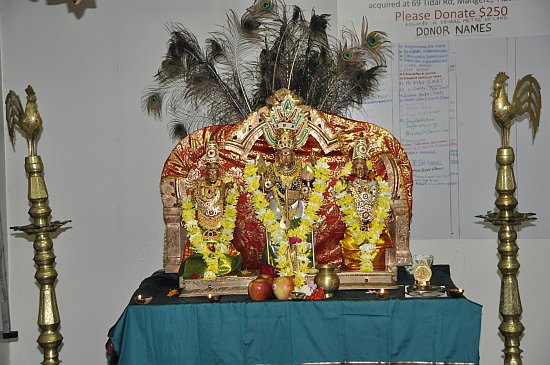Scholars and thinkers have said that Hinduism is a way of life rather than a religion with God worshipped as a Supreme Formless and Universal Self and as individual Gods and Goddesses.
Although a Single, Supreme Being is at the core of Hinduism as it is in many other religions of the world (notably Islam and Zoroastrianism), Hindus have evolved several forms of their favourite Gods and Goddesses and worship them under different names.
There are more than 90,000 Hindus in New Zealand (Census 2013), accounting for the third or fourth largest religious grouping. significantly larger than Muslims, Sikhs and other minorities. The Hindu Council of New Zealand has been active in promoting the values of Hinduism and appealing to local and federal governments to observe the basic tenets and teachings. It has also sought to reclaim the Diwali Festival from the City Councils since it believes that the Festival has become commercial, partial and controversial.
New Temples
The rising number of Hindus has had its impact on community organisations, charitable trusts, commercial enterprises and individuals. Encouraged by overall support, businesspersons have begun to evince interest in construction of Temples, either to augment the existing places of worship, relocate or promote new initiatives. Millions of dollars have been invested in land development and construction.
Social Centres
Hindu Temples, like their Christian, Anglican, Islamic and Sikh counterparts, have become more than places of worship. Many of them have community halls to conduct cultural programmes, weddings and other social events, commercial kitchens to prepare and serve food and library facility to spread the teachings of Hinduism.
As well as providing accommodation for Temple priests and visiting dignitaries, Hindu Temples have become venues for language, music, dance and other classes.
Great Teachings
Hinduism is based upon the teachings of God in the form of His incarnations and manifestations, the Vedas, Upanishads and the Bhagavad-Gita. According to legends, sages such as Valmiki and Vyasa wrote respectively The Ramayana and The Mahabharata (Tamilians follow the Ramayana version written by poet Kamban).
Hinduism guides its followers on the path leading to salvation, alleviating the sufferings of the mundane world.
It may appear a high flung philosophy but increasingly, people of other faiths, especially those in the Western world are beginning to appreciate its nuances and adapt its teachings with greater sincerity than many Hindus.
Yoga, Meditation and organised living are all parts of the Hindu philosophy, which the West has packaged as answers to the stress and strains of the modern work environment.
The Bhagavad Geeta is a treasure house of knowledge and its focal point is how people should conduct themselves as good human beings. Hinduism is not about rituals but righteous living.
Hinduism recognises that hypocrisy, vested interests and self-styled leaders could lead people astray but ultimately it is love and respect that would win the battle to reinstate righteousness.
Rights guaranteed
They said that India was an example of religious coexistence on the face of occasional intolerance, social amity amidst sporadic tension and communal harmony on the face of tension from time to time.
But none of these abrogates the right of people to worship and follow their faiths in Temples, Mosques or Churches. It is a pity that there is strife in certain areas but these should not detract us from the main path.
Hinduism accords the individual the right to question. There are no agents in religion.
Youth Power
The Hindu Organisations, Temples and Associations Forum (HOTA) has been working hard to bring together Hindus and encourage them to follow the tenets of Hinduism for a better morrow. The Forum’s emphasis on the development of the Hindu youth as a positive power of influence for future betterment also deserves recognition and support.
The Forum has the potential to become a significant vehicle to carry Hindu values, traditions and beliefs, provided it channels its energy into positive areas of contribution, and not dissipate its energy in fighting unwarranted causes.
The bane of most Hindu organisations is that they are wrought by internal strife, which develops itself into personality cults, leading to discard and despair. While Hindu leaders and elders in this country have done yeomen services to the community in particular and the society in general, they have failed to forge the kind of unity and solidarity that is required of them, save on a rare occasion or two and at national and international conferences.
The Forum has lofty ideals that could benefit not just the Hindu community but also all New Zealanders. Its idea of introducing Yoga, Ayurveda and Mediation as practices for the  mainstream New Zealand society could perhaps remove social ailments and make us all lead improved quality of life.
mainstream New Zealand society could perhaps remove social ailments and make us all lead improved quality of life.
Tolerance factor
It must be understood that Hinduism gave India an important avenue for tolerance. As a religion with countless Gods and sacred texts, it does not lend itself to extremism; and there are no rules for governments to enforce.
There is a need for Hindus to realise their rightful place in the society and promote ideals of universal fraternity, spirit of service and acceptance of all faiths as acts of God. They should also have the grace to accept into its fold even those who do not believe in the existence of God.
That in essence is the essence of Vishwa Kutumbam or One World Family.




